
February 09, 2021
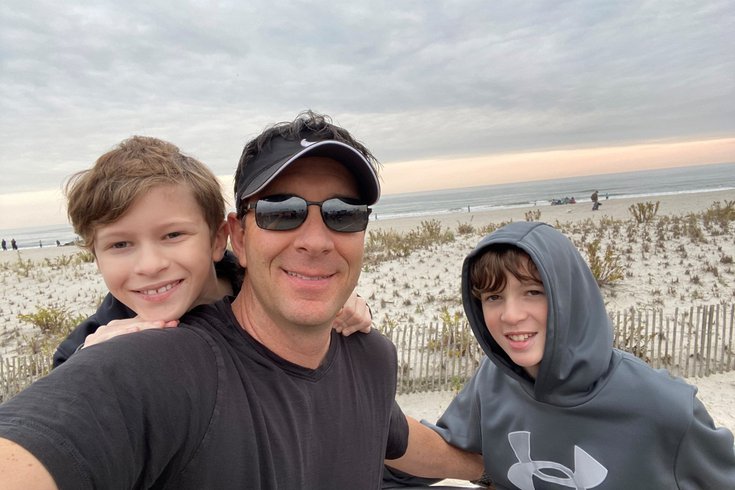 Courtesy/Dan DiZio
Courtesy/Dan DiZio
Dan DiZio and his sons on a trip to the Jersey Shore after DiZio recovered from COVID-19. Michael, left, Danny, right.
Dan DiZio smiled big behind his mask as he passed out bouquets of heart-shaped soft pretzels to the nurses and therapists at Magee Rehabilitation Center in Philadelphia.
Just eight months before, these were the same people who had helped the Philly Pretzel Factory CEO recover from a monthslong COVID-19 battle that nearly took his life.
"You guys are real heroes. From the bottom of my heart, thank you," he told the team of nurses during his visit last month. "I don't think you get the recognition you deserve."
When DiZio first entered Magee last May, he couldn't walk more than 5 feet on his own without becoming exhausted and falling out of breath. He had just spent more than a month on a ventilator while in a medically-induced coma. At Magee, he needed to learn how to walk and swallow again.
As DiZio was battling for his life, his business was hit hard by the restrictions enacted in response to the coronavirus pandemic. The Philly Pretzel Factory has more than 170 stores nationwide. Fifty of them temporarily closed during the pandemic.
"To come back eight months later and feel good — I thought I'd never be back to normal again. ... They did a great job," DiZio said.
Before DiZio got COVID-19, he says he was an active, healthy person. The 47-year-old ran 7-minute miles, lifted weights and ate a healthy diet. He did not have any known underlying medical conditions.
"For a very in-shape man that was running marathons and running every day ... this was really devastating," said Paula Bonsall, an occupational therapist at Magee. "He could have died."
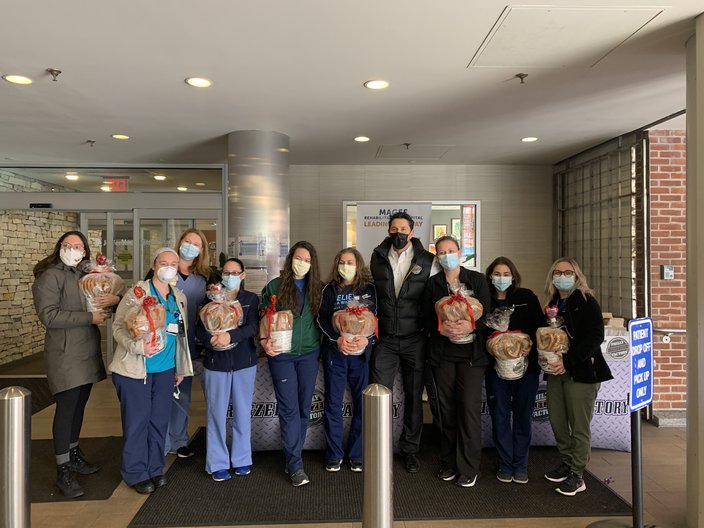 Hannah Kanik/PhillyVoice
Hannah Kanik/PhillyVoiceDan DiZio handed out heart shaped pretzels to the staff at Magee Rehabilitation Center Jan. 29.
DiZio is not 100% sure where he contracted the coronavirus. He said he started to feel sick on March 18.
A few days before, he had been set to travel to North Carolina for a business trip. He arrived at the airport and even went through security before deciding to cancel the trip. DiZio still felt fine at that point, but said the night before his trip, news reports of the rapid spread of the virus made him nervous, so he decided not to risk it and went home.
Days after being inside airport, DiZio began experiencing symptoms. It was still early in the pandemic — Tom Hanks had just been diagnosed and lockdowns were just beginning to be enforced in parts of the United States — and DiZio said he didn't think he actually had it.
But his condition worsened quickly. He remembers it was a Wednesday when he first had difficulty breathing and working out, and by Saturday night he had a fever and couldn't sleep.
"I thought I just had a cold at first, and then as it got more severe, I got nervous about it," he said. "Friday, it got much, much worse, and I had a fever that night, shakes all night. Saturday was when I started getting concerned and started to think about COVID."
His girlfriend of eight years, Danielle Forte, said she slept outside his bedroom on the floor the night before he went to the hospital. DiZio didn't want to get her sick, but she didn't want to leave him alone as he was struggling to breathe.
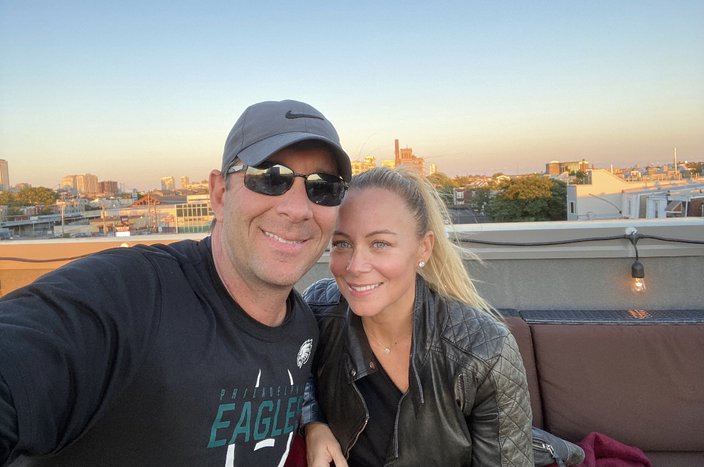 Courtesy/Danielle Forte
Courtesy/Danielle ForteDan DiZio and his girlfriend, Danielle Forte.
"He couldn't swallow his own saliva and kept spitting in a cup and just was coughing horribly," Forte said. "So it was a bit of a rough night."
DiZio and Forte drove in separate cars to get a COVID-19 test at Holy Redeemer Hospital in Abington that Sunday. In the hour it took to get the test, DiZio was feeling so much worse that he immediately drove to Jefferson Hospital, with Forte following close behind. It took them nearly an hour to get there.
DiZio described being in so much pain that he jumped out of his car at Jefferson, leaving it running as he scrambled into the emergency room.
"I was holding my neck like I was choking, because I thought my throat swelled up because I couldn't get air in," DiZio said. "I didn't realize it was my lungs not letting the air in."
Forte watched him run into the emergency room, figuring she wouldn't be able to visit him in the hospital. Because of the pandemic, Jefferson had begun restricting most visitors, making exceptions for patients in labor and those who appeared near death.
"That was the last time I saw him," she said. Forte later found out she had tested positive for COVID-19, though she had mild symptoms and recovered at home.
The next few days were a blur, and five days after checking into the hospital, DiZio was placed on a ventilator and in a medically-induced coma.
"It felt like years," Forte said. "It was scary, because it was nothing I ever thought I'd have to deal with — especially for him."
For five more weeks, DiZio was alone, hooked up to the ventilator. Forte called the doctors daily and kept a notebook of his vital statistics and treatments.
Doctors put him on an ECMO machine the next week, a device that pumps blood through an artificial lung, allowing the heart and lungs chances to heal. While it's used on patients facing serious health challenges, Forte said she viewed it as a miracle.
"I was thinking, 'This can't be real. He's young, he was so healthy and this can't be him going like this,'" Forte said. "I said to (the doctors), 'He would want you to be aggressive, so if there's something new you can try, or something you can give him, please do. Whatever it takes to get him better.'"
Then, DiZio's condition slowly started to improve. The doctors took him off the ventilator May 1, the day before his 48th birthday.
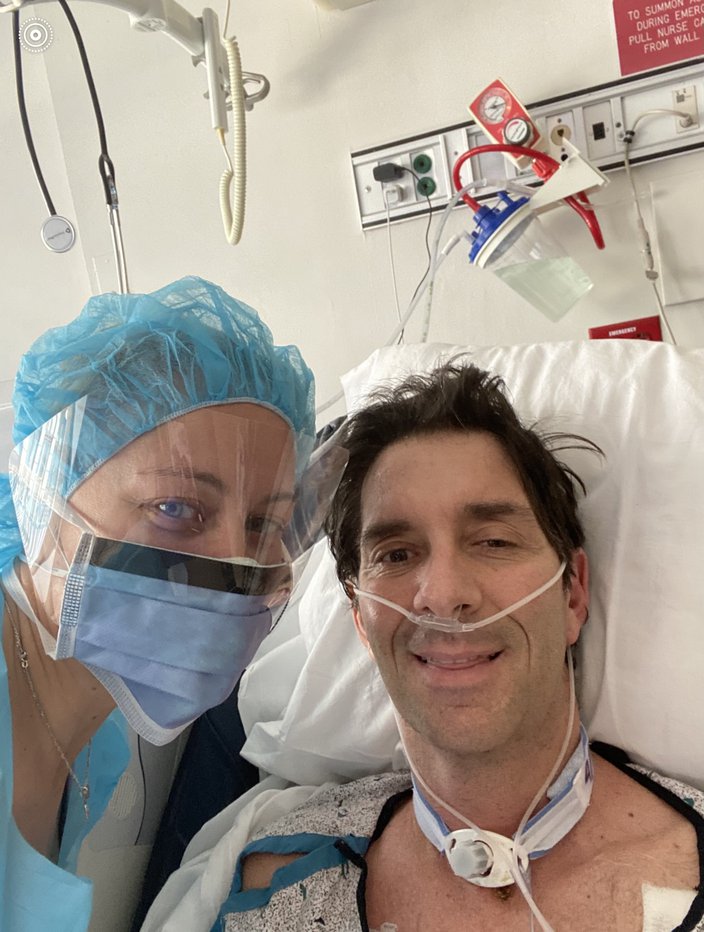 Courtesy of Danielle Forte/for PhillyVoice
Courtesy of Danielle Forte/for PhillyVoiceDan DiZio spent 6 weeks at Jefferson Hospital, where his girlfriend Danielle Forte was able to visit him before moving to Magee Rehab.
When DiZio had awoken from his coma, but he still had a long way to go. His right arm was paralyzed, he had a trach tube in his throat and a feeding tube in his stomach. He had lost 50 pounds and said he didn't recognize himself in the mirror.
"The nurses would say, 'It's unbelievable you're alive,'" he recalled. "I really didn't know what had happened to me, I just didn't even know that time had passed. The conversations that I had talking to people in March – and here we are in May – I felt like I spoke to those people two or three days ago. And here it was two months later, it wasn't two days ago."
Forte said she received a lot of support from friends and family throughout the process, and never lost faith that DiZio would pull through.
"I was positive the whole time, I was like there's no way this can happen, this can't be real," Forte said. "When he woke up and could look at me … when he was awake, I was like, oh my God, he's going to be OK."
Doctors told him his arm was paralyzed because he had suffered nerve damage from the position of his neck while in the medically induced coma. More worrisome, when the coronavirus attacked his lungs, it impacted the organs' ability to transport oxygen to his bloodstream, which resulted in brain damage and DiZio had to relearn how to walk and swallow.
The therapists at Magee said DiZio's condition was comparable to the other severe cases they'd seen, but stressed that everyone is different.
Aimee Aranguren, a speech language pathologist at Magee, said DiZio always wanted to do extra exercises in an attempt to get better as quickly as possible.
"He was an excellent patient in that way. Everything I told him, he followed through on," Aranguren said. "Although he had a very rough go during his medical stay, his swallowing luckily came back pretty quickly."
DiZio also pushed to do extra physical therapy — and he saw improvements. He said he didn't want to sit still in the bed and needed to be moving for both his physical and mental health.
"A normal life didn't seem like it was going to ever happen, to be frank," he said. "Everything was such an effort. Even though they told me they thought I could recover, it seemed impossible to me. But they did a great job, I was excited to get home and start rehabbing at home."
Forte said she would send DiZio cards every day — sometimes as many as three times in a day — to make sure he knew everyone was supporting him, even if they couldn't see him in the hospital or rehab centers.
"I do think part of his recovery was due to the fact that he was so healthy prior to this," Aranguren said. "He had very strong support from friends and family and he was a very self-motivated man, and those kinds of things make a difference. He was a go-getter, very goal focused."
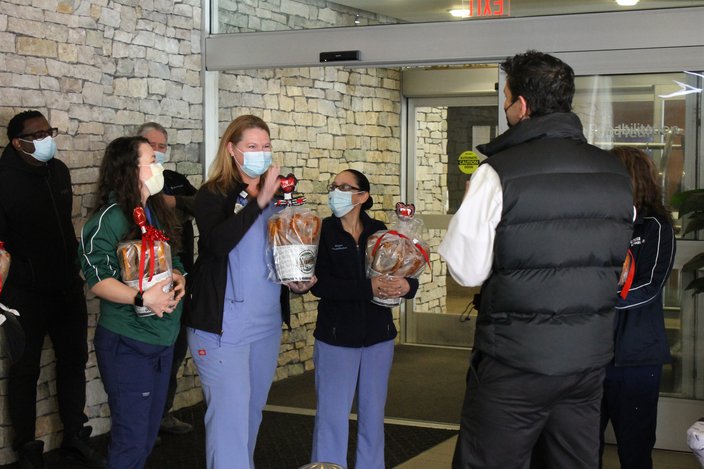 Hannah Kanik/PhillyVoice
Hannah Kanik/PhillyVoiceDan DiZio hands out heart-shaped pretzels to the staff at Magee Rehabilitation Center on Jan. 29.
As DiZio battled for his life, the Philly Pretzel Factory was trying to keep the business open. Employees said they were confident that DiZio would make a recovery and worked hard to support the franchise while he was in the hospital.
In April, sales dropped 70% for the month and 50 stores were required to close because of local lockdown regulations. After waking up from his coma, DiZio was brought up to speed on the pandemic's "devastating" impact on his business.
"It really changed the whole business model from what we were," DiZio said. "Our business is about celebration and gathering. There really were no celebrations and there was no gathering."
Franchises adapted to the pandemic economy and started delivering soft pretzels via Grubhub and DoorDash as well as offering curbside pick up at stores.
Despite the challenges, most locations were able to ride it out. Franchise owner Bob Tilton, who runs New Jersey stores in Mt. Ephraim, Deptford and Sewell, said his locations were largely able to break even so far through the pandemic. He's optimistic the business has weathered the worst.
"We have the vaccine coming out. … I think, from what I can see from sales going up, we should be able to continue up-ticking," Tilton said.
Tilton's stores have donated more than 32,000 soft pretzels to health care and front-line workers last spring, and he started a social media campaign asking members of the community to nominate hospitals or first responders to get free pretzel days.
"That was the exciting part, to see that there was some sort of success out there, despite how bad things were," DiZio said. "The community really responded to our time of need. ... It was amazing to see people writing into us saying, 'How can I help you?'"
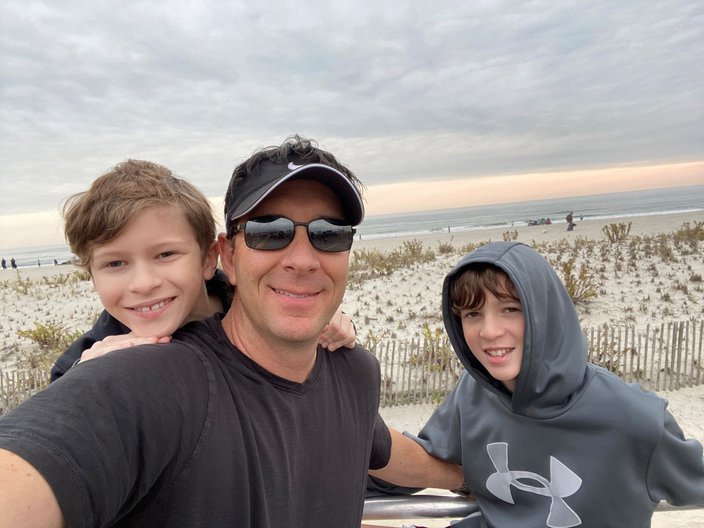 Courtesy/Dan DiZio
Courtesy/Dan DiZioDan DiZio and his sons on a trip to the Jersey Shore after DiZio recovered from COVID-19. Michael left, Danny, right.
As DiZio left Magee in May, his therapists played the "Rocky" theme for him. They danced as he walked out the same doors that he needed to be wheeled through just two weeks earlier.
"It gives me goosebumps to think about what they did, because nobody knew about the virus and how it would affect them, and they really put their lives on the line to help other people," DiZio said. "Thank God for people like that, that are willing to do that."
After months of anxiety and uncertainty, DiZio said he knew he was going to be OK after celebrating Father's Day with his family at the Jersey Shore.
The family, including his two sons, ages 9 and 12, got WaveRunners and enjoyed the good weather together.
"It was just great to see him with his boys because he missed them so much and they missed him," Forte said. "They didn't want to leave his side. They love him so much, they look up to him so much and he's such a great dad."
DiZio said being together again with his family was a great feeling.
"No matter how long I live, I think that will always be my most special Father's Day I'll ever have, to be able to be there for them. I think it was for them as well," he said.
Follow Hannah & PhillyVoice on Twitter: @hannah_kanik | @thePhillyVoice
Like us on Facebook: PhillyVoice
Add Hannah's RSS feed to your feed reader
Have a news tip? Let us know.